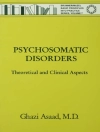Poor adherence to therapy is one of the main obstacles to treatment effectiveness in schizophrenia. It is the main determinant of relapse, hospitalization, symptom persistence, and poor psychosocial functioning and outcome. Adherence to treatment is affected by various factors related to the disease characteristics, to the patient him- or herself, to the treatment, and to the therapeutic relationship. Some of these factors are modifiable, and both pharmacological and non-pharmacological strategies have been developed for this purpose. This book addresses the different aspects of adherence to treatment in schizophrenia and related disorders in a systematic but easy-to-use manual format. Chapters focus on a full range of issues, including pharmacological and non-pharmacological strategies to enhance adherence and continuity of care, relevant psychological factors, the importance of the patient-doctor relationship, and the need for an alliance with other care-givers. Adherence to Antipsychotics in Schizophrenia will be an invaluable asset for all who are involved in the care of patients with schizophrenia.
Tabela de Conteúdo
1 Poor adherence to antipsychotic medication in people with schizophrenia: diffusion, consequences, and contributing factors.- Premise.- Role of antipsychotics in the treatment of schizophrenia.- Compliance versus adherence.- Assessment of medication adherence.- Frequency of poor adherence to antipsychotics.- Consequences of poor adherence to antipsychotics.- Determinants and moderators of adherence to antipsychotics.- Present and medium-term perspectives.- Closing Remarks.- 2 Pharmacological strategies to enhance adherence in schizophrenia.- Introduction.- Pharmacological factors contributing to non-adherence: efficacy, side effects, regimen, co-therapies.- First vs Second generation antipsychotics: efficacy, tolerability and the adherence issue.- Long-acting injectable antipsychotics.- Conclusion. 3 Non-pharmacological strategies to enhance adherence and continuity of care in schizophrenia.- Introduction.- Factors Influencing (non-)adherence in Schizophrenia.- Interventions to Enhance Adherence. Research and Clinical Evidence.- Comprehensive Review of Psychosocial and Programmatic Interventions to Enhance Adherence to Antipsychotic Medication in Schizophrenia.- Summary of Main Results and Evidences.- Conclusions and Future Directions.- 4 Psychological issues in improving adherence and alliance.- The patient-doctor relationship as a determinant of adherence to treatment.- Alliance and psychodynamic issues.- Towards the concept of concordance of the therapeutic project.
Sobre o autor
Emilio Sacchetti is full professor of Psychiatry at the Faculty of Medicine and Surgery of Brescia University, Director of the School of Psychiatry and President of the Course of Study in Psychiatric Rehabilitation Techniques Degree of the same University. He is also Scientific Director of Center EULO for the Study and Research of Behavioral and Degenerative Disorders. Antonio Vita is associate professor of Psychiatry at the Faculty of Medicine and Surgery of Brescia University. Alberto Siracusano is the Director of the Unit of Psychiatry and Clinical Psychology of the University Hospital Tor Vergata in Rome Wolfgang Fleischhacker is Director Department of Psychiatry and Psychotherapy, Medical University Innsbruck, Austria












